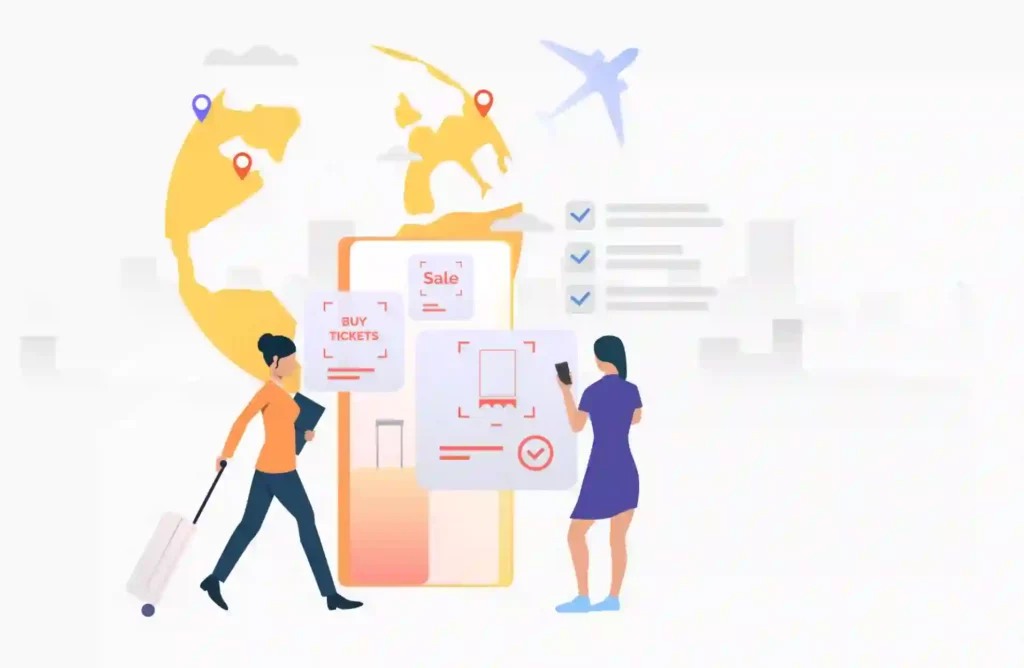Calling out travel industry innovators and flight booking app developers! As the champions of tomorrow's travel experiences, you know better than anyone how essential it is to stay ahead of the curve in this rapidly evolving landscape.
And that's precisely why we're here today! In this game-changing article, we'll delve into the 15 cutting-edge trends set to shape the future of flight booking platforms, arming you with the knowledge you need to stay one step ahead of the competition.
From AI-driven personalization to blockchain-powered security, we've rounded up the most groundbreaking innovations just around the corner, all with the potential to take your travel agency or booking app to unprecedented heights. So, if you're ready to elevate your business and seize the future of travel, you've come to the right place.
Let's dive in and explore the future trends of flight booking platforms that you need to adapt in order to get ahead of the competition.

1. The Rise of Flight Data APIs
Flight Data APIs have become crucial for travel agencies, developers, and booking platforms, enabling them to offer accurate and up-to-date flight details.
Key APIs include Flight Status API, which tracks real-time flight updates; Flight Price API, which allows users to compare fares from various airlines; and IATA Code API, which enables quick identification of airlines and airports using their unique codes. By leveraging these APIs, businesses can enhance customer experience, streamline operations, and stay ahead in the competitive travel market.
2. Personalized Recommendations
Think Netflix recommendations, but for flights. Harnessing the power of AI and Big Data, the future of flight booking platforms will provide tailored flight suggestions based on individual preferences, travel history, and even social media behavior. This level of personalization will make your customers feel understood and drive loyalty.
3. Voice-Activated Bookings
As voice assistants like Alexa and Siri continue to gain popularity, expect voice-activated flight bookings to become the norm. Travelers will soon be able to book their flights simply by asking for their smart devices, making the process quicker and more efficient.
4. Enhanced Price Prediction
Predictive analytics are going to play a huge role in the future of flight booking platforms. By analyzing historical data and current market trends, your platform will be able to provide accurate price predictions, helping travelers snag the best deals and save some serious cash.
5. Virtual Reality Previews
VR technology will enable customers to virtually "experience" their flights before booking. By offering immersive 3D tours of airplane cabins and airport lounges, your platform will give travelers a better sense of what to expect and help them make more informed decisions.
6. Dynamic Pricing Models
As travel agencies and developers become more sophisticated, so will pricing models. Dynamic pricing, which adjusts fares in real-time based on supply and demand, will become the standard. This will ensure your platform remains competitive while maximizing revenue.
7. Blockchain Technology
Blockchain technology is set to transform the way flight bookings are processed and managed. By using decentralized, secure ledgers, travel agencies, and developers will be able to eliminate intermediaries, streamline operations, and reduce costs.
8. Eco-Conscious Travel Options
Sustainability will play a more significant role in the future of flight booking platforms. Expect to see more eco-conscious options, such as carbon offsetting and green flight routes, that enable travelers to minimize their environmental impact while still exploring the world.
9. Seamless Multi-Modal Booking
Flight booking platforms will increasingly need to accommodate multi-modal travel. By integrating train, bus, and car rental options alongside flights, your platform will provide customers with a one-stop shop for all their travel needs.
10. Chatbots and AI-Powered Customer Support
As customer expectations evolve, travel agencies and developers will need to adapt to ensure they are providing top-notch support. Chatbots and AI-powered customer support will become essential, enabling instant, 24/7 assistance without the need for human intervention. These tools will also help reduce operational costs and streamline support processes.
11. Biometric Authentication
Biometric authentication, such as fingerprint and facial recognition, will be increasingly integrated into flight booking platforms. This technology will offer an extra layer of security, ensuring user data is protected and simplifying the check-in process at airports.
12. Augmented Reality
Augmented Reality (AR) will play a growing role in the travel industry, particularly in flight booking platforms. AR can be used to provide travelers with interactive maps, destination information, and even real-time flight updates, creating a more immersive and informative experience.
13. Machine Learning-Driven Marketing
Machine learning will help travel agencies and developers refine their marketing strategies and better target potential customers. By analyzing user behavior and identifying patterns, machine learning algorithms will enable more effective, personalized marketing campaigns that drive conversions and boost customer retention.
14. Data Privacy and Security
As flight booking platforms handle vast amounts of sensitive user data, maintaining robust data privacy and security measures will be crucial. Travel agencies and developers will need to invest in advanced encryption technologies and adhere to strict data protection regulations to ensure the trust and confidence of their customers.
Key Takeaways
The flight booking industry is on the cusp of a new era marked by groundbreaking innovations and rapidly evolving customer expectations. Travel agencies and developers who stay ahead of these emerging trends will be best positioned to capitalize on the vast opportunities presented by this dynamic landscape.
Embracing cutting-edge technologies, prioritizing personalization, and focusing on customer satisfaction are just a few of the strategies that industry professionals can employ to ensure their flight booking platforms remain competitive and relevant in the years to come.
As we look to the future, it's clear that the flight booking experience will be nothing short of extraordinary. And for travel agencies and developers who are ready to rise to the challenge, the sky's the limit.

